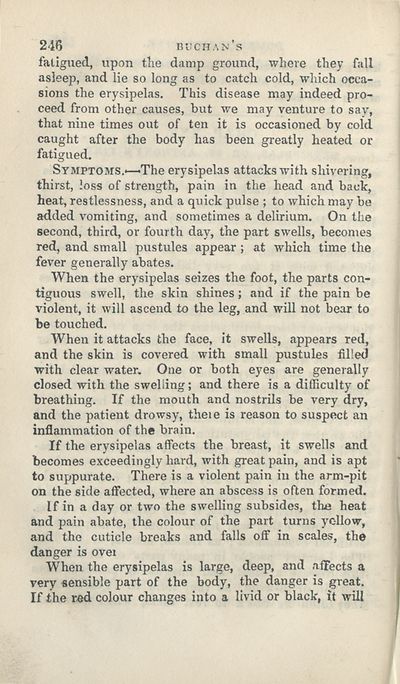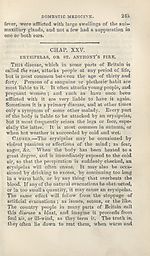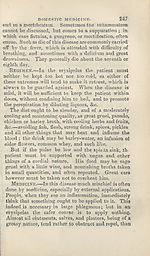Diseases > Domestic medicine
(280)
Download files
Complete book:
Individual page:
Thumbnail gallery: Grid view | List view

fatigued, upon the damp ground, where they fall
asleep, and lie so long as to catch cold, which occa¬
sions the erysipelas. This disease may indeed pro¬
ceed from other causes, but we may venture to say,
that nine times out of ten it is occasioned by cold
caught after the body has been greatly heated or
fatigued.
Symptoms.*—The erysipelas attacks with shivering,
thirst, loss of strength, pain in the head and back,
heat, restlessness, and a quick pulse ; to which may be
added vomiting, and sometimes a delirium. On the
second, third, or fourth day, the part swells, becomes
red, and small pustules appear ; at which time the
fever generally abates.
When the erysipelas seizes the foot, the parts con¬
tiguous swell, the skin shines; and if the pain be
violent, it will ascend to the leg, and will not bear to
be touched.
When it attacks the face, it swells, appears red,
and the skin is covered with small pustules filled
with clear water. One or both eyes are generally
closed with the swelling; and there is a difficulty of
breathing. If the mouth and nostrils be very dry,
and the patient drowsy, theie is reason to suspect an
inflammation of the brain.
If the erysipelas affects the breast, it swells and
becomes exceedingly hard, with great pain, and is apt
to suppurate. There is a violent pain in the arm-pit
on the side affected, where an abscess is often formed.
If in a day or two the swelling subsides, the heat
and pain abate, the colour of the part turns yellow,
and the cuticle breaks and falls off in scales, the
danger is ovei
When the erysipelas is large, deep, and affects a
very sensible part of the body, the danger is great.
If the red colour changes into a livid or black, it will
asleep, and lie so long as to catch cold, which occa¬
sions the erysipelas. This disease may indeed pro¬
ceed from other causes, but we may venture to say,
that nine times out of ten it is occasioned by cold
caught after the body has been greatly heated or
fatigued.
Symptoms.*—The erysipelas attacks with shivering,
thirst, loss of strength, pain in the head and back,
heat, restlessness, and a quick pulse ; to which may be
added vomiting, and sometimes a delirium. On the
second, third, or fourth day, the part swells, becomes
red, and small pustules appear ; at which time the
fever generally abates.
When the erysipelas seizes the foot, the parts con¬
tiguous swell, the skin shines; and if the pain be
violent, it will ascend to the leg, and will not bear to
be touched.
When it attacks the face, it swells, appears red,
and the skin is covered with small pustules filled
with clear water. One or both eyes are generally
closed with the swelling; and there is a difficulty of
breathing. If the mouth and nostrils be very dry,
and the patient drowsy, theie is reason to suspect an
inflammation of the brain.
If the erysipelas affects the breast, it swells and
becomes exceedingly hard, with great pain, and is apt
to suppurate. There is a violent pain in the arm-pit
on the side affected, where an abscess is often formed.
If in a day or two the swelling subsides, the heat
and pain abate, the colour of the part turns yellow,
and the cuticle breaks and falls off in scales, the
danger is ovei
When the erysipelas is large, deep, and affects a
very sensible part of the body, the danger is great.
If the red colour changes into a livid or black, it will
Set display mode to:
![]() Universal Viewer |
Universal Viewer | ![]() Mirador |
Large image | Transcription
Mirador |
Large image | Transcription
| Antiquarian books of Scotland > Diseases > Domestic medicine > (280) |
|---|
| Permanent URL | https://digital.nls.uk/119891502 |
|---|
| Description | Thousands of printed books from the Antiquarian Books of Scotland collection which dates from 1641 to the 1980s. The collection consists of 14,800 books which were published in Scotland or have a Scottish connection, e.g. through the author, printer or owner. Subjects covered include sport, education, diseases, adventure, occupations, Jacobites, politics and religion. Among the 29 languages represented are English, Gaelic, Italian, French, Russian and Swedish. |
|---|

